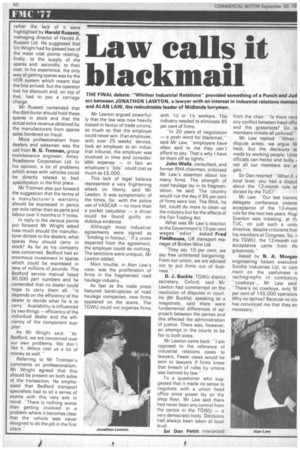Law calls it blackmail
Page 52

If you've noticed an error in this article please click here to report it so we can fix it.
THE FINAL debate: "Whither Industrial Relations" provided something of a Punch and Jud act between JONATHON LAWTON, a lawyer with an interest in industrial relations matters and ALAN LAW, the redoubtable leader of Midlands lorrymen.
Mr Lawton argued powerfully that the law was now heavily biased in favour of trade unions, so much so that the employer could never win. If an employee, with over 25 weeks" service, took an employer to an industrial tribunal, the employer was involved in time and considerable expense — in fact an employee's "'bite" could cost as much as £5,000.
This lack of legal balance represented a very frightening attack on liberty, said Mr Lawton. It was symptomatic of the times, for, with the police use of VASCAR — no more than a pocket calculator — a driver could be found guilty on dubious evidence.
Although most industrial agreements were signed as "binding in honour," if a union departed from the agreement, the employer could do nothing. The sanctions were unequal, Mr Lawton added.
Main trouble, in Alan Law's view, was the proliferation of firms in the fragmented road haulage industry.
As fast as the trade press featured bankruptcies of road haulage companies, new firms appeared on the scene. The TGWU could not organise firms with 1U or 1 5 workers_ The industry needed to eliminate 95 per cent of firms.
"In 20 years of negotiation — a posh word for blackmail," said Mr Law, "employers have often said to me they can't afford to pay. That's why I have let them off so lightly.'" John Wells, consultant, and former R HA chairman, criticised Mr Law's assertion about too many firms. The strength of road haulage lay in its fragmentation, he said. The country would rue the day if 95 per cent of firms were lost. The RHA, he felt, could do more to clean up the industry but for the effects of the Fair Trading Act.
What was Mr Law's reaction to the Government's 10 per cent wages "edictasked Fred Fieldhouse, UK transport manager of Bridon Wire Ltd.
"They say 10 per cent; we say free unfettered bargaining. From our union, we are advised not to put firms out of business.'" D. J. Buckle, TGWU district secretary, Oxford, said Mr Lawton had commented on the resolution of disputes in court. He (Mr Buckle), speaking as a magistrate, said there were fundamental differences of approach between the parties and this affected the administration of justice. There was, however, an attempt in the courts to be fair to both sides.
Mr Lawton came back: "I am opposed to the reference of industrial relations cases to lawyers. Fewer cases would be sent to lawyers if firms knew that breach of rules by unions was banned by law. "
To a questioner who suggested that it made no sense to • negotiate with a union head office since power lay on the shop floor, Mr Law said there had never been any control from the centre in the TGWU — a very democratic body. Decisions had always been taken at local level.
Sir Dan Pettit interjected from the chair: "Is there nevr any conflict between head offic and the grassroots? Do la members initiate all policies?"
Mr Law replied: "When dispute arises, we argue lik heck, but the decisions ar made by working people. Unio officials can hector and bully not all our members are ar gels."
Sir Dan retorted: "What if, local level, you had a disput about the 12-month rule er dorsed by the TUC?"
Mr Law: "Our last bienniz delegate conference orderer acceptance of the 12-mont rule for the next two years. Hugl Scanlon was insisting, at th TUC, on just such a unioi directive, despite criticisms fror his members at Congress. So, ii the TGWU, the 12-month ruf acceptance came from thr grassroots." '
Asked by N. A. Morgan engineering liaison executive Smiths Industries Ltd, to corn men/ on the usefulness o tachographs in combatinr "cowboys',, Mr Law said -There's no cowboys, only 9( per cent of 145,000 operators Why no tachos? Because no on has convinced me that they an necessary."






































































































